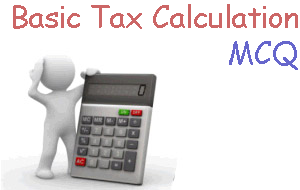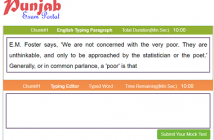1. Surcharge of 10 per cent is payable by an individual where the total income exceeds:
a) Rs.7,50,000 b) Rs.8,50,000 c) Rs.10,00,000 d) None of the three
Ans c
2. Additional surcharge (education cess) of 3% per cent is payable on
a) Income tax b) Income tax plus surcharge c) Surcharge
Ans b
3. Family pension received by a widow of a member of the armed forces where the death of the member has occurred in the course of the operational duties, is
a) Exempt up to Rs.3,00,000 b) Exempt up to Rs. 3,50,000
c) Totally exempt under section 10(19) d) Totally chargeable to tax
Ans c
4. In respect of shares held as investment, while computing the capital gains, securities transaction tax paid in respect of sale of listed shares sold in a recognized stock exchange,
a) Is deductible up to Rs.1,00,000 b) Is deductible up to Rs.2,00,000
c) Is deductible if C.G.’s is < 5,00,000 d) Is not deductible at all
Ans d
5. Gift of Rs 5,00,000 received on 10 July, 2008 through account payee cheque from a non-relative regularly assessed to income-tax, is
a) A capital receipt not chargeable to tax b) Chargeable as other sources
c) Chargeable to tax as business income
d) Exempt up to Rs.50,000 and balance chargeable to tax as income from other source
Ans b
6. The rate of tax that is leivable on STCG arising from transfer of Equity shares of a Company or
units of an Equity oriented fund is
a) 10% b) 15% c) 20%
Ans b
7. For an employee in receipt of hostel expenditure allowance for his three children, the maximum annual allowance exempt under section 10(14) is
a) Rs.10, 800 b) Rs.7,200 c) Rs.9,600 d) Rs.3,600
Ans b
8. For an industrial undertaking fulfilling the conditions, additional depreciation in respect of a machinery costing Rs.10 lakh acquired and installed on October 3, 2005 is
a) Rs.75,000 b) Rs.1,50,000 c) Rs.1,00,000 d) None of the above
Ans c
9. Assessee is always a person but a person may or may not be an assessee.
a) True b) False
Ans a
10. A person may not have assessable income but may still be assessee.
a) True b) False
Ans a
11. In some cases assessment year and previous year can be same financial year.
a) True b) False
Ans a
12. A.O.P should consist of :
a) Individual only b) Persons other than individual only c) Both the above
Ans c
13. Body of individual should consist of :
a) Individual only b) Persons other than individual only c) Both the above
Ans a
14. A new business was set up on15-11-2008 and it commenced its business from 1-12-2008.The first previous year in this case shall be:
a) 15-11-2008 to 31-3-2009 b) 1-12-2008 to 31-3-2009 c) 2008-2009
Ans a
15. A person leaves India permanently on 15-11-2008.The assessment year for income earned till 15-11-2008 in this case shall be:
a) 2007-08 b) 2008-09 c) 2009-10
Ans b
16. Surcharge in case of an individual or HUF for assessment year 2009-10 is payable at the rate of :
a) 12% of the income-tax payable provided the total income exceed Rs.60,000.
b) 10% of the income-tax payable provided the total income exceeds Rs.10,00,000
c) 5% of the income-tax payable if the total income exceeds Rs.8,50,000
Ans b
17. Surcharge in case of a firm for assessment year 2009-10 is payable at the rate:
a) 2.5% of income-tax payable b) 5% of income-tax payable c) 10% of income-tax payable
Ans c
18. The maximum amount on which income-tax is not chargeable in case of firm is:
a) Rs.1,00,000 b) Rs. 90,000 c) Nil
Ans c
19. The maximum amount on which income-tax is not chargeable in case a co-operative society is:
a) Rs.50,000 b) Rs.30,000 c) Nil
Ans c
20. A local authority is taxable at flat rate of income-tax.
a) True b) False
Ans a
21. A co-operative society is taxable at flat rate of 30% on TI.
a) True b) False
Ans b
22. Education cess is leviable @:
a) 3% b) 5% c) 2.5%
Ans a
23. Education cess is leviable in case of:
a) An individual and HUF b) A company only c) All assesses
Ans c
24. In case of an individual and HUF education is leviable only when the total income of such
a) Exceeds Rs.10,00,000 b) No income limit
Ans b
25. The TI of the assessee has been computed as Rs.2,53,494.90. For rounding off ,the TI will betaken as:
a) Rs.2,53,500 b) Rs.2,53,490 c) Rs.2,53,495
Ans a
26. Income tax is rounded off to:
a) Nearest ten rupees b) Nearest one rupee c) No rounding off of tax is done
Ans a
27. A’s TI for the A.Yr.2009-10 is Rs.2,50,000.His tax liability shall be
a) 10,000 b) 10,300 c) 11,330
Ans b
28. Residential status to be determined for :
a) Previous year b) Assessment year c) Accounting year
Ans a
29. Incomes which accrue or arise outside India but are received directly into India are taxable in case of
a) Resident only b) Both ordinarily resident and NOR c) Non-resident d) All the assesses
Ans d
30. Income deemed to accrue or arise in India is taxable in case of :
a) Resident only b) Both ordinarily resident and NOR c) Non-resident d) All the assesses
Ans d
31. Income which accrue outside India from a business controlled from India is taxable in case of:
a) Resident only b) Not ordinarily resident only
c) Both ordinarily resident and NOR d) Non-resident
Ans c
32. Income which accrue or arise outside India and also received outside India taxable in case of:
a) resident only b) not ordinarily resident
c) both ordinarily resident and NOR d) none of the above
Ans a
33. TI of a person is determined on the basis of his:
a) residential status in India b) citizenship in India c) none d) both of the above
Ans a
34. Once a person is a resident in a P.Yr. he shall be deemed to be resident for subsequent P. Yr.
a) True b) False
Ans b
35. Once a person is resident for a source of income in a particular P. Y r. he shall be deemed to be resident for all other sources of income in the same P. Yr :
a) True b) False
Ans b
36. R Ltd., is an Indian company whose entire control and management of its affairs is situated outside India. R Ltd., shall be :
a) Resident in India b) Non-resident in India c) Not ordinarily resident in India
Ans a
37. R Ltd., is registered in U.K. The control and management of its affairs is situated in India .R Ltd
shall be :
a) Resident in India b) Non-resident c) Not ordinarily resident in India
Ans b
38. R, a foreign national visited India during previous year 2008-09 for 180 days. Earlier to this he never visited India. R in this case shall be:
a) Resident in India b) Non-resident c) Not ordinarily resident in India
Ans b
39. An Indian company is always resident in India
a) True b) False
Ans a
40. Dividend paid by an Indian company is:
a) Taxable in India in the hands of the recipient b) Exempt in the hands of recipient
c) Taxable in the hands of the company and exempt in the hands of the recipient
Ans c
41. Agricultural income is exempt provided the:
a) Land is situated in India b) Land is situated in any rural area India
c) Land is situated whether in India or outside India.
Ans a
42. If the assessee is engaged in the business of growing and manufacturing tea in India ,the agricultural income in that case shall be:
a) 40% of the income from such business b) 60% of the income from such business
c) Market value of the agricultural produce minus expenses on cultivation of such produce
Ans b
43. Agricultural income is :
a) Fully exempt b) Partially exempt c) Fully taxable
Ans a
44. The partial integration of agricultural income, is done to compute tax on:
a) Agricultural income b) non agricultural income
c) Both agricultural and non agricultural income
Ans b
45. There will be no partial integration of agricultural income with non agricultural income, if the
non agricultural income does not exceed:
a) Rs.1,50,000 b) Rs. 1,00,000 c) Rs.1,10,000
Ans a
46. There will be no partial integration, if the agricultural income does not exceed:
a) Rs.40,000 b) Rs.50,000 c) Rs.5,000
Ans c
47. A local authority has earned income from the supply of commodities outside its own
jurisdictional area. It is :
a) Exempt b) Taxable
Ans b
48. R, a chartered accountant is employed with R Ltd., as an internal auditor and requests the employer to call the remuneration as internal audit fee. R shall be chargeable to tax for such fee under the head.
a) Income from salaries b) Profit and gains from Business and Profession
c) Income from other sources.
Ans a
49. R, who is entitled to a salary of Rs.10,000 p.m. took an advance of Rs.20,000 against the salary in the month of March 2009.The gross salary of R for assessment year 2009-10 shall be:
a) Rs.1,40,000 b) Rs.1,20,000 c) None of these two
Ans a
50. A is entitled to children education allowance @ Rs. 80 p.m. per child for 3 children amounting
Rs. 240 p.m. It will be exempt to the extent of :
a) Rs.200 p.m. b) Rs.160 p.m. c) Rs. 240 p.m.
Ans a





1 Comment
hello admin, please also upload the basic material on the subjectve or objective questions on topic covering 50 question for upcoming paper of municipal corporaion( like noting and drafting,,account code) and also explain the nature of job profile of sr.assistant.